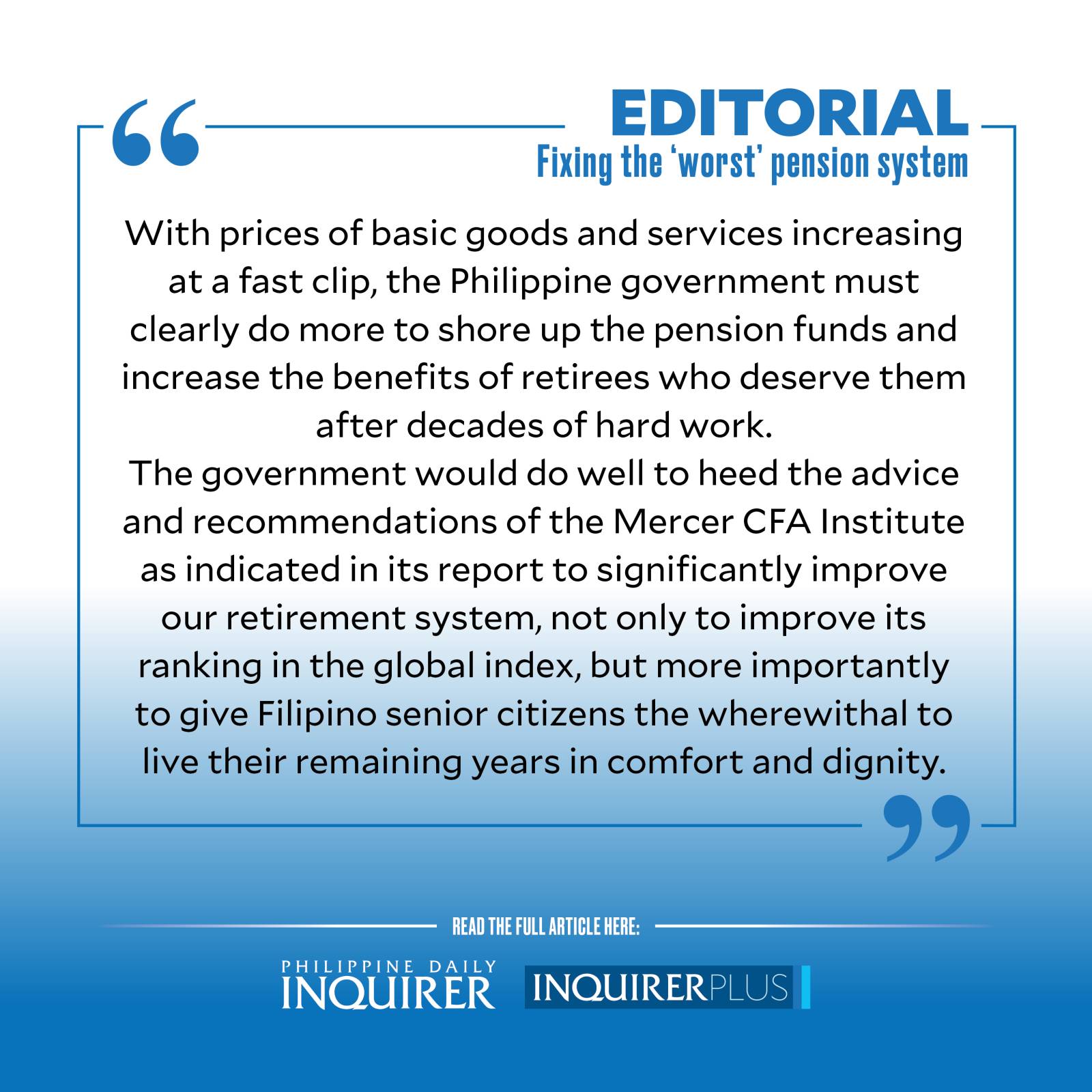Fixing the ‘worst’ pension system
If you think that retirement in the Philippines means lazing about, drink in hand, while soaking up the sun on a beach somewhere, well, you’re in for a reality check.
More likely, the twilight years would mean more toil and trouble as a mere 20 percent, or just one of five elderly Filipinos aged at least 60, receive a government pension.
And based on 2020 estimates, they receive a paltry average monthly pension of P18,525 from the Government Service Insurance System and an even leaner P5,123 from the Social Security System. Obviously, these amounts are woefully inadequate to cover the rising prices of basic goods and services, much less sustain a comfortable lifestyle.
No wonder then that, according to the 14th annual Mercer CFA Institute Global Pension Index (MCGPI), the Philippines has the second worst retirement income system—after Thailand—among 44 countries that account for 65 percent of the world’s population.
Released last week, the 2022 edition of the MCGPI, which benchmarks retirement income systems around the world, shows that the Philippines scored 42.0 in the index, slightly lower than the 42.7 out of a possible 100 it got in 2021.
The closely followed MCGPI rankings are based on the weighted average of the adequacy, sustainability, and integrity subindices to measure each retirement system against more than 50 indicators. The Philippines ranked in the bottom five of listed countries in terms of adequacy (how beneficial the actual pension system is to the poor), and was rated the worst in integrity (how well the public and private pension systems are regulated), not just in the region but globally.
This contributed to making the Philippines one of three countries in Asia—the other two being Indonesia and China—whose retirement income systems deteriorated in 2022.
The drop in the Philippines’ ranking widened its gap with Iceland, which topped the pension rating for the second year in a row with a score of 84.7, and regional leaders Singapore (ranked ninth globally with an index value of 74.1) and Malaysia (ranked 23rd with an index value of 63.1).
The Philippines’ subpar retirement system puts it firmly in the D category along with Argentina, Thailand, Indonesia, Turkey, and India, indicating “major weaknesses and/or omissions” in its retirement system that must be addressed.
“Without these improvements, [the retirement system’s] efficacy and sustainability are in doubt,” the Mercer-CFA Institute said.
MCGPI said Asia was showing steady progress in terms of improving its pension systems, though it still lagged behind other regions with an overall index value of just 53.8, far below the global average of 63. The increasing life span in the region isn’t helping, as the retirement systems will need to increase their buffer to cover the added years in retirement.
“Hence, governments cannot afford to put refining and improving their retirement systems on the back burner, but must prioritize and take action promptly,” stressed Janet Li, Mercer’s Asia Wealth Business leader.
To increase the overall index value for the Philippines’ retirement income system, Mercer recommended, among others, that the country raise the minimum level of support for the poorest elderly Filipinos, and tighten government requirements for private pension systems.
Mercer also advised citizens to not just rely on their expected government pension, but to personally beef up their retirement funds as they are exposed to “potential shortcomings in financial support post-retirement,” with the government allotting its limited resources to other equally urgent needs.
The Philippine government acknowledged as much with the Bangko Sentral ng Pilipinas (BSP) encouraging Filipinos for years to open a Personal Equity and Retirement Account, a voluntary retirement savings program that comes with tax perks, for example, to help save up for their retirement.
As then BSP governor and now Finance Secretary Benjamin Diokno noted, Filipinos are far from being prepared for retirement, as they set aside only 3.6 months’ worth of their regular income for their twilight years, a mere fraction of the average of 2.9 years retirement savings among other Asians.
Filipinos also expect that a total savings equivalent to 2.1 years’ worth of personal income would be enough for them to live comfortably during their retirement years. This is the lowest level in the region, where the average is 12 years’ worth of personal income.
With prices of basic goods and services increasing at a fast clip, the Philippine government must clearly do more to shore up the pension funds and increase the benefits of retirees who deserve them after decades of hard work.
The government would do well to heed the advice and recommendations of the Mercer CFA Institute as indicated in its report to significantly improve our retirement system, not only to improve its ranking in the global index, but more importantly to give Filipino senior citizens the wherewithal to live their remaining years in comfort and dignity.





















